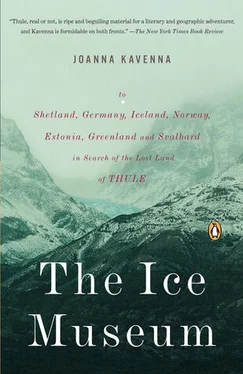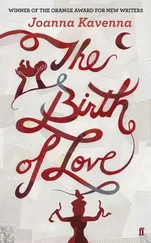At the end of the empty road was the muted town of Pärnu, where the pebbled beach stretched to the cold sea. There were lines of wooden houses, the paint falling off their walls, the bricks crumbling like parchment. There was a fairground with a Ferris wheel, the empty carriages rocking in the wind. On a cranky carousel which kept stopping, children were screaming and clapping their hands, and then the rain fell, swift and hard, across the beach, and they were all picked up and taken away.
In Pärnu I stopped at the former summer house of a German-Portuguese millionaire named Ammende. Ammende built the place at the turn of the century in a wilfully, buoyantly decadent style. From the outside the building was a modernist brick parody of a country house with a superfluous tower sticking out of the roof. It stood out; the rest of Pärnu was low and wooden, like a lost Swedish village stranded on a Baltic coast. But Villa Ammende was celebrating its facelift. The place had been picked out of the ruins, dusted and painted, reopened as a Jugendstil hotel.
I was hammering on the doors, which were like the gateway to a Gothic mansion. There was no answer, so I found a cord and tugged it and something like a bell echoed through the building, the sound more like a buffalo in pain. Another pause, while the rain fell harder, beating onto the muddy road, onto the grandiose steps to the villa. I was hunched into my coat, beginning to think I would have to run back to the car. But then there was the sound of bolts being drawn back, and a face peered through a crack. A patch of darkness opened up behind him, as if the door entered into a void.
He said: ‘Yes?’
I said: ‘Do you have a room?’
He looked startled and slightly appalled, as if it were still the summer house of millionaire Ammende and I were in breach of every code of conduct in the Baltic aristocrats’ rulebook, and then he opened the door a little more, drawing me towards the darkness. He said: ‘Come in here, please.’
We walked into a dark hall, a few glass eyes glinting in the dark, staring from the stuffed heads of animals positioned around the stairs. There was a vast fireplace, a bronze monstrosity, its opulent curls tapered to art nouveau points. Everything was art nouveau—every intricately curled pattern, every curved chair leg, every shimmering frieze. There was something elegant about the lines, but then there were all the animals, a bestiary of dead things, as if the owner had recently been for a massive shooting spree, and had picked off a game park. There was a stuffed lion, hammered to the first set of stairs; a moose or two, stuck to the wall; a huge brown bear lolling on the upper landing. The man, who was pale and nervous, was fumbling for a piece of paper. Among the clutter of the overdressed hallway there was a small wooden desk with an inkwell, and he sat behind it and put the piece of paper down. He tried to find a pen. He rummaged frantically in a drawer. He started to blush.
I handed him my pen.
‘Yes, yes, quicker that way . . .’ he said.
His hands were shaking as he took the pen.
He had suffered a terrible shock, it seemed. He had been rattling around this empty mansion, enjoying the silence, and then there had been a terrible hammering on the doors, the sound of the bell tolling through the corridors. He was still slightly startled; he eyed me with suspicion.
‘Nationality?’
‘Occupation?’
The answer made him jiggle the pen around.
‘What do you write?’
‘Reason for visit?’
‘How did you hear about the place?’
I told him why I was in Estonia, and he had a brief nervous collapse. He tried to hide it, but he was sweating when he lifted his face again and his hands were knocking on the desk.
‘Really?’ he said. ‘You have been speaking to our first president?’
After that everything changed and he practically bowed me into the billiard room.
It was all beautiful and empty and slightly absurd. The billiard room was set up for a rainy afternoon, for visitors who enjoyed languid games while they smoked elegantly, stubbing the cigarettes into ornate ashtrays. There was a bar for cocktails, prepared for these affable legions of vanished gentlemen. In the drawing room everything was green—the ceilings were painted into luscious spirals; the tables stood on finely curved legs. Everything was abundant, defying the dour streets outside. It was like a set for an Evelyn Waugh novel, a perfect backdrop for decadent aristo-bohemia, slurred vowels over tea, indolent intrigues to the slow winding of the gramophone. Villa Ammende had been empty for years before it was restored into a hotel. I stayed a night, the only guest, eating alone in an echoing dining room designed in recovered opulence, opulence fanning itself, still remembering its nightmarish swoon, the years as a Soviet lunatic asylum, or prison, or training centre—the decadent corridors filled with the terseness of officialese. When a waiter came along the corridor, the footsteps echoed around the high ceilings. The bored concierge put me in the most lavish suite—perhaps in the name of Meri—a three-roomed luxury complex, with a sauna, a bedroom with engraved cupboards, art nouveau murals, and a living room with ornate oak shelves, full of German classics: Goethe, Thomas Mann, the Brothers Grimm.
It was beautiful, but there was an air of suspense to the rooms, as if Ammende had just gone off to the beach with a group of friends recently arrived from Vilnius, and would be returning for tea. Any moment, I thought, wandering through the empty corridors, disconcerted by the silence, a whole pile of aristo-Balts would appear—raffish, slightly tired after an energetic walk—and demand cocktails and ices. Any moment the gramophone would wind into action and a few women in furs would emerge to tap their fingers on the curved arms of the chairs. In the empty corridors, I kept turning around, expecting to find someone there with their hand outstretched, saying how do you do. There was no one there, just the glass eyes of a stuffed bear, peering from a balustrade.
This was the opulence which fled with the Balts. The Estonians never knew much about the champagne flutes and the delicate curved feet of the chairs in Villa Ammende. They said they were simple people, surviving through generations because of their affinity with the trees, their love for the swamp plains. It was a national story, a fable they told themselves, but they had been labourers for generations, living on farms, deprived of any access to wealth. Meri had been talking about it, the knowledge of the land, the attraction to simple things. It made them despise the Soviet system, he had said, because it polluted and exploited and never considered the corrosive effects of engine fuel or nuclear reactors on the countryside. There were Estonians who hid in the forests; some of them formed resistance groups, living for years out of society, away from Soviet repression.
It was a deep historical feeling, a memory of the stones, Lennart had said. Cleaning it up, cleaning up the wrecks of Soviet ships sunk in the harbours, the polluted lands, coated with fuel, the nuclear debris, the wreckage of the collective farms, meant a lot to the Estonians. They tried to clean away the past, the years of brown and grey, the suspense and dullness, the compromises they made, the collusion with the Soviets which allowed some to prosper. They tried to clean up the guilt, the regret, the ambivalence.
I slept strangely in Villa Ammende, waking to see the sun bright on the lawn, where aristo-Balts should already have been walking, perambulating under parasols. The house was silent as I walked down for breakfast. A waitress poured coffee, and the clinking of the spoon as I swirled in the milk echoed through the room.
When I left, the lonely man on the desk waved me down the steps. ‘Come again,’ he said. ‘During the high season, we are very full. But other times of year, like now for example, you only need to give us a few days’ notice.’ I wondered if most of the time he and the waitress lived it up in Villa Ammende, twirling around the sitting room to music from the gramophone, leafing through the library of German classics, patting the stuffed lion on the head. The bacchanalia only stopped when the bell tolled through the corridors; then they put on their uniforms and became solemn and monosyllabic. As I drove off I imagined the man on the desk whipping off his grey suit and donning a red velvet smoking jacket, slinking into the billiard room to pot a few balls, before his first whisky of the day.
Читать дальше












